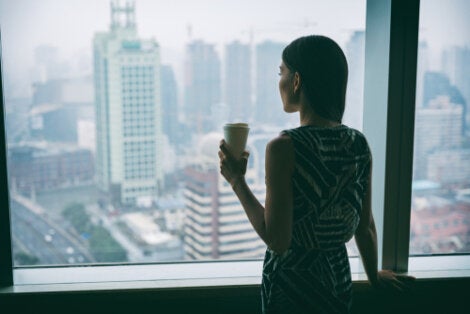Getting a Coffee with Friends - Nostalgia in the Time of Coronavirus


Written and verified by the psychologist Valeria Sabater
Getting a coffee with friends, having dinner with your significant other at a restaurant, heading to the gym after work, walking along a busy street to do some shopping…
This pandemic has taken many activities that used to be part of our day-to-day lives from us, those activities that allowed us to connect with other people and enjoy being sociable.
As you know, people aren’t meant to be shut up in their houses. The quarantine has been very hard to get used to. Most people aren’t happy with this “new normal”.
Your mind and your heart feel the absence of other people. Places you used to go to find company and find yourself as well. Social contact is a basic human need. Thus, when you don’t have it, everything seems a little off.
Until very recently, sociologies, psychologists, and architects were already thinking about city design for the future. We know now that huge urban areas often lead to unhealthy solitude, so people have been coming up with plans for “third places”. The idea is to prioritize common spaces that foster a sense of community, interaction, sociability, and mutual care.
Today, these goals are critically important. Humans need social interaction for their psychological and physical well-being. However, the current pandemic is forcing us to reconsider many aspects of daily life. We need to find an appropriate balance between health, safety, and well-being.

Getting a coffee with friends – the importance of third places
Getting a coffee with friends is more than just a fun tradition. It’s a moment to share concerns, experiences, feelings, and personal stories.
These moments of connection between two, three, or four people with a cup of tea, a cup of coffee, or a beer help reduce stress and strengthen social bonds. Since the pandemic started, we’re all longing for these experiences.
Ray Oldenburg, a sociologist and urban planning expert, coined the term “third places” to talk about the importance of public, social places outside of work and home. These are coffee shops, restaurants, stores, barbershops, gyms, clubs, or libraries.
Cities are made up of these places, but so are our human identity and personalities. Missing these spaces is perfectly normal because they have an importance that goes beyond what you might think.
The magical intimacy of third places
The quarantine has brought us back to that first human social setting: the home. To a certain extent, this is a positive consequence of the pandemic.
If you approach the situation the right way, this is a unique opportunity to reconnect with yourself and your family. It can also be a time of peace, creativity, and rest. A time to listen to each other and take care of each other while the world is on pause, trying to fight the coronavirus.
The intimacy of the home is important, but you have another, equally critical social need. We’re talking about the social connection you find in these third places. Getting a coffee with friends, for example, creates a healthy attachment to people and public spaces. That, in turn, creates another kind of emotional refuge that has a positive impact on your physical and psychological health.

Our second homes
Going out at night for a beer, spending time in the bookstore looking for a novel, getting coffee with friends… All of these settings where we do many day-to-day activities become like a second home. When you’re in these spaces, you feel seen, alive, happy, and even self-actualized.
Sometimes, all it takes is walking around a crowded grocery store, going to the gym, or even going to the movies on your own. In other words, the key isn’t always spending time with friends and family outside your home.
Sometimes, it’s enough to wander around these vibrant social spaces and enjoy the sounds, activities, and everything that the community has to offer.
In spite of our collective solitude, we’re still connected and hopeful
You know that you’ll be able to get a coffee with friends at some point in the future. However, you might have to do it in a slightly different way. For example, keeping your distance and putting up invisible barriers so that people don’t get too close. However, you shouldn’t dwell on those limitations. Being around other people will still be cathartic.
We all know that this too shall pass. The world will change again, and we’ll change with it. Social spaces will be transformed, but humanity, hard-headed and innovative as it is, will create new spaces where we can engage and find one another again.
Although the pandemic has affected our social lives, we’ll find ways to knit it back together, stronger than ever. We need each other more than ever, and with some creativity and grit, we’ll find the way to do it safely.
Getting a coffee with friends, having dinner with your significant other at a restaurant, heading to the gym after work, walking along a busy street to do some shopping…
This pandemic has taken many activities that used to be part of our day-to-day lives from us, those activities that allowed us to connect with other people and enjoy being sociable.
As you know, people aren’t meant to be shut up in their houses. The quarantine has been very hard to get used to. Most people aren’t happy with this “new normal”.
Your mind and your heart feel the absence of other people. Places you used to go to find company and find yourself as well. Social contact is a basic human need. Thus, when you don’t have it, everything seems a little off.
Until very recently, sociologies, psychologists, and architects were already thinking about city design for the future. We know now that huge urban areas often lead to unhealthy solitude, so people have been coming up with plans for “third places”. The idea is to prioritize common spaces that foster a sense of community, interaction, sociability, and mutual care.
Today, these goals are critically important. Humans need social interaction for their psychological and physical well-being. However, the current pandemic is forcing us to reconsider many aspects of daily life. We need to find an appropriate balance between health, safety, and well-being.

Getting a coffee with friends – the importance of third places
Getting a coffee with friends is more than just a fun tradition. It’s a moment to share concerns, experiences, feelings, and personal stories.
These moments of connection between two, three, or four people with a cup of tea, a cup of coffee, or a beer help reduce stress and strengthen social bonds. Since the pandemic started, we’re all longing for these experiences.
Ray Oldenburg, a sociologist and urban planning expert, coined the term “third places” to talk about the importance of public, social places outside of work and home. These are coffee shops, restaurants, stores, barbershops, gyms, clubs, or libraries.
Cities are made up of these places, but so are our human identity and personalities. Missing these spaces is perfectly normal because they have an importance that goes beyond what you might think.
The magical intimacy of third places
The quarantine has brought us back to that first human social setting: the home. To a certain extent, this is a positive consequence of the pandemic.
If you approach the situation the right way, this is a unique opportunity to reconnect with yourself and your family. It can also be a time of peace, creativity, and rest. A time to listen to each other and take care of each other while the world is on pause, trying to fight the coronavirus.
The intimacy of the home is important, but you have another, equally critical social need. We’re talking about the social connection you find in these third places. Getting a coffee with friends, for example, creates a healthy attachment to people and public spaces. That, in turn, creates another kind of emotional refuge that has a positive impact on your physical and psychological health.

Our second homes
Going out at night for a beer, spending time in the bookstore looking for a novel, getting coffee with friends… All of these settings where we do many day-to-day activities become like a second home. When you’re in these spaces, you feel seen, alive, happy, and even self-actualized.
Sometimes, all it takes is walking around a crowded grocery store, going to the gym, or even going to the movies on your own. In other words, the key isn’t always spending time with friends and family outside your home.
Sometimes, it’s enough to wander around these vibrant social spaces and enjoy the sounds, activities, and everything that the community has to offer.
In spite of our collective solitude, we’re still connected and hopeful
You know that you’ll be able to get a coffee with friends at some point in the future. However, you might have to do it in a slightly different way. For example, keeping your distance and putting up invisible barriers so that people don’t get too close. However, you shouldn’t dwell on those limitations. Being around other people will still be cathartic.
We all know that this too shall pass. The world will change again, and we’ll change with it. Social spaces will be transformed, but humanity, hard-headed and innovative as it is, will create new spaces where we can engage and find one another again.
Although the pandemic has affected our social lives, we’ll find ways to knit it back together, stronger than ever. We need each other more than ever, and with some creativity and grit, we’ll find the way to do it safely.
This text is provided for informational purposes only and does not replace consultation with a professional. If in doubt, consult your specialist.







